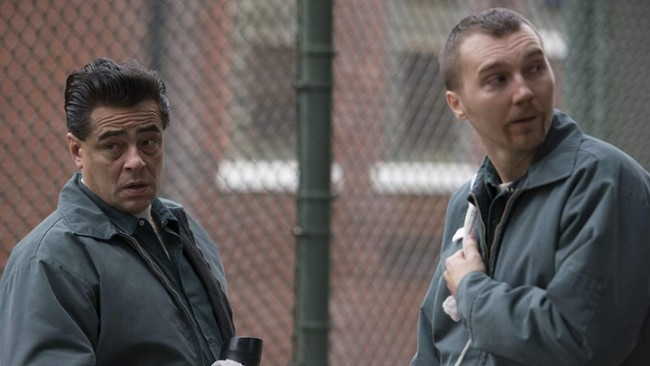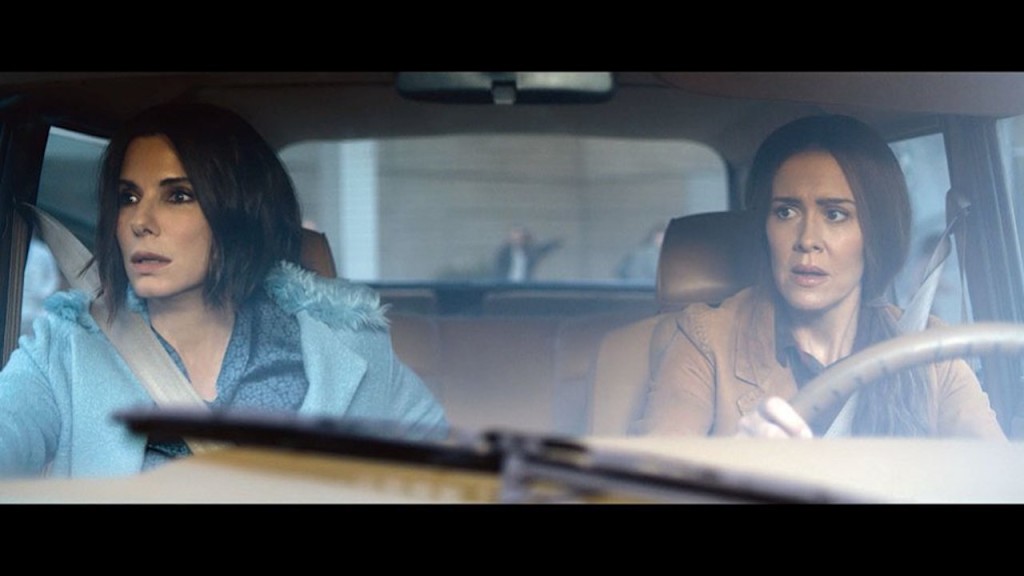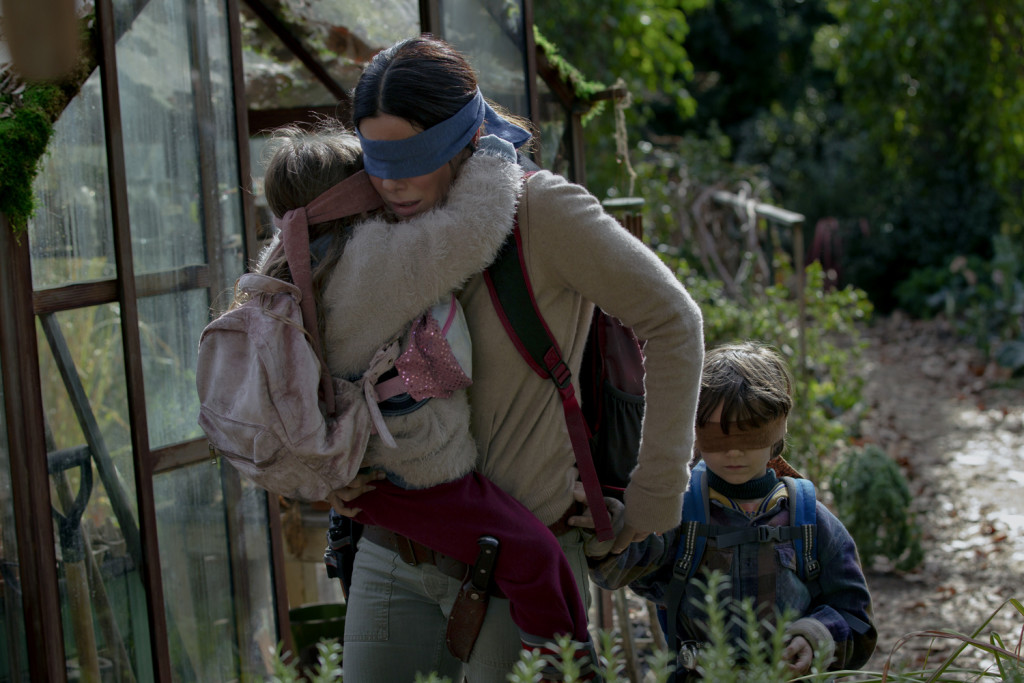Scriptshadow may be on a break til the new year. But that doesn’t mean I’m not thinking of you! Is anyone doing the 10-Day Writing Challenge? How are you holding up? Don’t think, just write. That’s the key to defeating WR (Writing Resistance).
I’ve used this time to relax and catch up on some entertainment. I saw Bumblebee. It was surprisingly good, even if it took the screenplay for E.T. and copy-replaced every instance of “E.T.” with “Bumblebee.” Oh stop. I kid because I love. It was nice to have a director who actually cared about character this time around. A huge upgrade over the original Transformers movies for sure. Another movie I saw was Predator. Oh boy, that was a rough one. For the first 30 minutes, I was convinced I was watching the worst movie of 2018. I mean we have the autistic genius child trope, the Tourette Syndrome trope, the wise-cracking comedy relief trope. If there’s a trope that didn’t get used in this movie, I’m not aware of it. To the film’s credit, it gets better as it goes on. But not by much.
As for Netflix viewing, I tried to watch that John Grisham True Crime series, The Innocent Man. It’s pretty good. If good means boring. An episode and a half in and I know two women were murdered and confessions were made. I knew these things before the show started. Move faster please. I tried to watch that Black Mirror choose-your-own-adventure episode but pressing play informed me that my technology wasn’t up-to-date enough to watch it. Figuring this was part of the fun, I pressed play again. Same message. And again. Same message. Eventually I realized this wasn’t part of the show and that I really did have old technology. I guess no Black Mirror for me.
This turned out to be a blessing in disguise because it led me to check out Escape at Dannemora, the Showtime show that Ben Stiller directed. Ben Stiller is one of the most underrated directors in the business. He’s really really good. And this show doesn’t even utilize his keen directing eye. It’s all about character, acting, and story. I’ve only watched one episode but this may be the best TV show I’ve seen all year. I may do an article on it in the future. So check out the show!
Finally, someone told me about this writing program called Hemingway Editor. It operates within your browser so you don’t have to download anything. The program’s hook is that it assesses your writing on the fly, showing you what’s weak via various highlights. It also tells you (in real time) what level your writing is. I copy and pasted some of my writing on there for fun, and found that the majority of it hovers between 3rd and 4th grade level, lol. Um, can someone say, ego boost? Here I was this whole time aiming for kindergarten. Convinced it was faulty, I copy and pasted some famous works in there, such as a page of Mary Shelley’s Frankenstein, and her writing is at a 12th grade level!
I’m trying to figure out how it assesses this grade. I suspect big vocabulary words (which Shelley likes to use) may be contributing to the number. Maybe you guys can play with it and help find out. It’s kind of like a video game. What do you do to get your score up? Let me know what you come up with in the Comments Section!
A couple of you alerted me to this the other day. Why Jordan Peele is releasing a horror trailer on Christmas is beyond me. But it seems to have worked. Everyone is talking about this trailer. As you guys know, I loved that script for Get Out. However, when you have an out of nowhere hit for your first film, it’s almost impossible to follow it up. The combination of hits being lightning in a bottle and insane expectations result in something that’s often a huge let down. But holy schnikeeze does this look good. “Us” has easily become my most anticipated movie of 2019. Not only that, but it’s actually getting me excited for Jordan Peele’s Candyman reboot. Check out the trailer and try not to drool.
It’s a SPECIAL CHRISTMAS DAY CANDY CANE CONSULTATION OFFER. E-mail me at carsonreeves1@gmail.com with the subject line “CHRISTMAS CONSULTATION” and I will give you half-off my 4-Page Screenplay Notes package. Your script doesn’t have to be ready now. But you do have to pay to secure your spot. It’s been sixth months since I last offered this deal so e-mail quickly. The slots are going to go fast. In the meantime, here are some new year’s resolutions. Make sure to add your own resolutions to the comments section!
1) I will write strong ideas only – One of the biggest time wasters in screenwriting is starting with a weak concept. No level of execution can save a bad idea which means all those hours you spent writing that script were for naught. So let this be the year you stop wasting time on weak concepts only you, yourself, are interested in. In addition to sharing your concept with others to see if it’s any good, I suggest a 6-8 week incubation period for all new ideas. If you’re still excited to write the script 6-8 weeks after you came up with the idea, that’s a good indication the idea’s worth pursuing.
2) I will finish what I start – Most professional screenwriters will tell you that there are three times during each screenplay where you’re convinced the script doesn’t work and want to quit. The weak will fold during these moments. But fighting through these roadblocks often leads to the biggest creative breakthroughs. Not only that, but every time you stick with a script, you build the muscle that fights through obstacles and gets to the finish line.
3) I will set aside 2 hours a day, six days a week, to write – If you’re in your twenties with no family obligations, this number needs to be 4. But 12 hours a week is the absolute minimum for getting any significant writing work done. If you don’t think you have that much time, download one of those internet charting apps that tells you how long you’ve spent browsing each day. You’ll quickly realize you have more than enough time.
4) I will become better with character – Remember that the true currency of a Hollywood screenwriter is character. The screenwriters who can make their hero likable, add compelling flaws, add inner conflict, add vices, explore unresolved relationships, and arc characters, all in an emotionally affecting way that feels organic and invisible, are the ones who will rise to the top of the mountain. Every year, you should be pushing yourself to create bigger, deeper, more interesting characters.
5) I will become a more original scene writer – In the last 50 scripts I’ve read, I’d say that 97% of the scenes are ones I’ve seen already. Writers aren’t pushing themselves on a scene-by-scene basis to give us a consistently fresh story. This doesn’t mean every scene has to be the most original thing ever. It means that you’re not taking the lazy way out. The best way to beat this problem is to come up with a concept we haven’t seen before. Fresh concepts lead to all sorts of fresh scene opportunities. Lots of A Quiet Place’s scenes were new because the concept (if you make a noise, the monsters kill you) was new.
6) I will master two new screenwriting skills this year – Pick two major screenwriting skills (dialogue, theme, suspense, loglines, concepts, prose, conflict, dramatic irony, second act structure, setups and payoffs, etc.) and commit to mastering them by the end of the year. And do this every year. That means whenever you have free time, read an online article or a chapter about that specific writing tool. Then practice it. Write short scripts utilizing it. Write practice scenes focusing on it. If you’re not trying to improve specific screenwriting skills, you’re never going to get better.
7) I will stop blaming my lack of success on the external – I get it. If you’ve failed to succeed at screenwriting, it’s easier to blame the system (or nepotism, or geography, or sexism, or ageism). That way, you don’t have to take responsibility for your lack of success. But there is power that comes from taking responsibility. If you accept it’s something in yourself that’s hurt you, you have the ability to work on and change it. Blaming others is a bad way to live life anyway.
8) I will set clear goals for myself – The vaguer you are with your yearly goals, the less motivation you’ll have to finish them. Write out clear achievable goals and hit them. If you don’t know where to start, target one major screenwriting contest in the first half of the year and a second contest in the second half. Have a screenplay done and sent by each deadline. By all means necessary, meet your goals!
9) I will get feedback – Stop living in your bubble. Stop making excuses. You’re not getting anywhere in this business without feedback. Get your scripts out to people. Listen to what they have to say. The number of things I assumed weren’t problems in my screenwriting but were in my early days is embarrassingly large. You’ve got blind spots as well. And you’ll never correct them until you have a third party telling you what they are.
10) I will enjoy myself – Remember why you got into screenwriting in the first place. Because you love movies. So if you’re ever down or angry or frustrated during a writing session, step away from the computer, take a deep breath, remember back to that feeling you had when you first decided to become a screenwriter, SMILE, then get back to it. Our job is to entertain others. If you can’t have fun doing that, what can you have fun doing?
Genre: Horror
Premise: (from IMDB) Five years after an ominous unseen presence drives most of society to suicide, a mother and her two children make a desperate bid to reach safety.
About: Bird Box started off as a novel. Screenwriter Eric Heisserer (Arrival) actually began adapting the novel before it was finished. How early on was this adaptation process? Heisserer would occasionally call Josh Malerman to see if it was okay to add something here or there in the movie, to which Malerman would reply, “Ooh, that’s good. Can I put that in the book?”
Writer: Eric Heisserer (based on Josh Malerman’s novel)
Details: 2 hour running time
It’s been a long time since I read the script for Bird Box but I remember liking it a lot. And not just for its concept. The script’s central idea – not being able to look at the monsters – was a brilliant way to keep the movie cheap. If the characters don’t see them, neither do we, and that means you get an expensive monster movie without having to create expensive monsters. And it’s not only that. Much of what scares people in horror movies isn’t the actual monster, but the threat of the monster, which is why you can get away with showing so little for so long. That’s the theory, anyway. Did this approach work for Bird Box? Let’s find out.
Bird Box had one of the best openings to a film all year. If we’re being honest, it’s hard to screw “world falling apart” openings up. Even the most basic imagery – people running for their lives, screaming, violence, chaos – is exciting to watch. But that’s been the problem as of late. Directors have been showing that and only that, and it’s gotten a bit stale. Susan Bier’s choices here feel much more intense, such as a random woman in the hospital banging her bloody head against the window than staring down the pregnant Malorie. Or Malorie’s sister, who’s trying to escape this chaos, driving them away before *seeing* one of these things, only to switch into suicide mode, weaving the car in and out of traffic while Malorie attempts to stop her. It was not only incredibly intense, but it brilliantly set up the movie’s hook – DON’T LOOK.
From there, Bird Box switches to a cross-cutting structure that stuffs Malorie into a suburban house with ten other characters right after the event, then occasionally cuts to five years later, where Malorie and two young children are attempting to navigate a boat down a river while all three are blindfolded, representing the new reality for anyone who survived the initial event. The three are attempting to get to a bunker full of people, which is conveyed via an opening radio voice over of a man explaining where the bunker is and how to get there.
So how did the movie hold up? Was it as good as the script?
For a good portion of the film, yes. Especially the first half. There was a genuine excitement born out of what just happened, not completely understanding the threat, and needing to learn the rules. John Malkovich is such a great actor and his unique personality brought an energy to the early house scenes that ensured we were always entertained.
From there, the first script change arrived (or at least, I don’t think this was in the script – maybe someone can confirm this). Bier and Heisserer expanded the mythology so that instead of only needing to see the monsters to turn suicidal, certain people would become influencers, tricking humans into believing it was okay to look, encouraging them to take off their blindfolds, only for it to be a lie. The duped party would see the monster and then commit suicide.
I understood why they did this. When you need to keep your eyes closed to live, you keep your eyes closed. Even if someone were to rip your blindfold off, you could still just shut your eyes. This way, there was an added threat. Especially because these “influencers” would pretend to be normal people. For the most part, this worked, as it led to two of the more exciting scenes in the film (a man trying to get inside of the supermarket and a man attacking the boat). It made the mythology a little murkier, but overall it was a clever choice.
Bier made a couple of choices that hurt the film, though. For starters, she placed these characters in a giant beautiful house. Not only that, but the inhabitants covered the windows with a series of perfectly crafted rainbow-esque paper, casting a beautiful spectrum of colors across the walls and characters at all times. It was in stark contrast to the dark dreary hopeless house that was painted in the script. And it wasn’t just that. It feels like more characters were added. Too many. This gave the big bright perfectly lit house a party atmosphere. I was supposed to feel scared. Instead I wanted to go out clubbing.
The critical moment for Bird Box came about 70% of the way into the film. A few scenes after letting a new member into the house, a middle aged British business man, we learn that he’s actually an influencer. He begins spouting his demon rhetoric and ripping the covering off all the windows, forcing everyone to look. One by one, all of the people start dying. If there were a meter on the side of every movie telling you, on a scale from 1 to 10, how well the current scene was working, the meter would’ve been at a 3 here. For the first time, it became evident that Bird Box’s conceit of never seeing the monsters was hurting it. This moment was the culmination of the pervious 70 minutes. It needed to be big. It needed monsters. Instead, we got a mildly threatening British man yelling a bunch of gibberish.
Another issue I wish they would’ve hashed out was the relationship between Malorie and the children. It was so cold as to be nonexistent. The reason this is a big deal is because the entire emotional thru-line of the 5 Years Later storyline is built on the connection between Malorie and those children. If you look at the major comp for Bird Box, A Quiet Place, that film put a ton of focus on establishing a connection between the parents and the children. Here they assume we’ll do that work for them, and that’s always a dangerous game to play. I never got the sense that Malorie had a connection to these two kids. I feel like that could be its own TV show – Assumptions In Screenwriting. It would cover assumptions writers make and the disastrous effects of doing so.
With that said, Bird Box is better than most of the movies Netflix makes. It’s stylish. It’s got big budget production values. The acting is strong. I have a feeling this will be a big hit for the streaming service.
[ ] What the hell did I just watch?
[ ] wasn’t for me
[x] worth the stream
[ ] impressive
[ ] genius
What I learned: I’ll leave this question up to you guys. Is never seeing the monster a good thing? Or, at some point, have you built up so much curiosity that you need to show it? Eric Heisserer, in an interview with Slash Film, is sticking to the film’s guns. “We realized the moment that one of us started talking about even small features of what the monster might be, or the antagonist, down to a specific silhouette of a shadow or an appendage that entered the frame somewhere, there was always someone else in the room who would say, “Well, that isn’t scary to me.” So it defeated the purpose. We kept pulling back.
Genre: Holiday Comedy
Premise: When Santa Claus’ protégé is killed in an avalanche, the next relative in line, a New York cop with no holiday spirit, is taken to the North Pole for his training until he must save Christmas from the grinch-like Krampus.
Why You Should Read: Apart from this script placing in the finals of both the Fresh Voices and Studio 32 screenplay competitions. It is a fresh new take, from two hungry writers, into the mythology of how to become the father of Christmas. It’s nostalgic, comedic and downright magical.
Writers: Matt Ritchey & Michael Onofri
Details: 101 pages
Merrrrrry Christmas everybody! I hope you get everything under the tree you wished for. I hope you don’t have to spend much time in airports over the holiday, what with all the sniffly flu-ridden travelers looking to spread their disease like candy canes. I luckily don’t have to take the worst Christmas flight ever this year (that would be LAX to O’HARE), as I’ll be working on my tan in good old Los Angeles. Praise St. Nick.
Now to our Holiday Amateur Offerings Battle. As much as I was rooting for Droid Rage to win due to its zany premise, it received two late suspicious votes that did not seem to be in the Christmas spirit. That’s okay because Christmas Academy sounds funner than a sleigh ride after the season’s first snow, like something Bruce Willis would’ve made after Die Hard 3 to poke fun at the genre. I’m loving the energy of the premise already. Let’s hope it’s more of a Lego Millennium Falcon gift than a pair of socks (which my brother got me last year. His rationale: “Everybody needs socks.”).
Every 200 years, Santa Claus must pass the baton to a new Santa, which is exactly what St. Nick is doing when we meet him. However, an unexpected avalanche obliterates the poor successor, leaving Santa to improvise. He decides to hold a Santa-Off for three distant relatives with the winner awarded the “Santa” title. But he’s going to have to move fast. Christmas is in less than a month!
Cut to New York City where we meet beat cop Chris Kimble. Chris is a bull in a china shop with attitude to spare, the kind of guy who will run up thousands of dollars of damage for every perp he brings in. After Chris does just that in his introductory scene, leaving a trail of Christmas carnage to catch a thief who he has to let go due to not properly reading him his Miranda Rights, his Captain suspends him for one month without pay.
This forces Chris, a Christmas hater, to take a Santa Department Store gig to pay the rent. While there, he’s approached by two store elves with suspiciously nice costumes. They tell him to follow them, and after going through some Narnia back closet, Chris finds himself in the North Pole! It’s there where he’s told he’s a distant relative to the Claus family, and will be participating in a competition to become the next Santa.
It shouldn’t be difficult. His competition is Melvin, an old dude who can barely walk straight. And Sandy, a hard-as-nails chick who’s so obsessed with winning she can’t see the forest through the Christmas trees. The thing is, Chris doesn’t care about winning. The only reason he participates is because Santa pays him to stay and compete.
Then a couple of things change. Chris starts to fall for Sandy. And some dude named Krampus starts stealing toys from the factory! Chris springs into cop mode to eliminate the threat. But when Krampus gets his hooves on Santa’s magic cloak, the thing that powers Christmas Eve, there’s a high probability there won’t be any Christmas this year. Unless, of course, Chris can stop him!
This is going to sound corny but I love the spirit of this script. Christmas is about letting go and having fun with the people you love, and there’s something undeniably fun about this premise. Every time I read the logline, I see the potential in it.
But here’s the thing. It’s really hard to write screenplays where the main character doesn’t care about achieving his goal. It’s not impossible. But it’s hard. And Christmas Academy is built around a protagonist who doesn’t care if he achieves his goal (winning the title of Santa Claus) or not.
This hurts comedies in particular. Jokes aren’t as funny if the character doesn’t care about succeeding. That’s because the character’s desire to succeed is what adds the stakes. And with stakes, it actually means something if the character fails. And failure (or the potential for failure) is where the funny is.
Look at Elf. Will Ferrel wants his father’s love more than anything. We know if he screws up, he could lose his dad. That’s what makes all his ridiculous mistakes so hilarious. Kevin must keep the burglars out of his house at all costs in Home Alone. We laugh because we care. Once you add the element of not caring, there aren’t as many jokes to be had. Or maybe I should say, you have to find your comedy somewhere else.
That was the strange thing about Christmas Academy. It felt like a comedy. But there were never enough jokes. Part of this is due to what I outlined. The other part is that there wasn’t any structure to the comedy. It was more of a “let’s put our character in generally funny situations and hope that comedy evolves somehow” approach. Like Chris’s opening scene. He chases the thief. Yeah, throwing snow globes at the thief is kind of funny. Yeah, stealing a Christmas horse and buggy with a couple inside is funny. But none of these were hard jokes. It was more of a “comedy adjacent” situation.
Let me give you a more specific example. I was unlucky enough to catch one of the Meet The Parents sequels on TV the other day. The scene I landed on was Greg (Ben Stiller) and Jack (Robert DiNero) at a giant kid’s party. The writers decided that it would be funny if Greg and Jack got into a big fight during the party. And I agree that, in theory, this is funny. You have the irony of a couple of adults having a full out brawl at a kid’s party. But there was no structure to this sequence, nor was there structure to any of the jokes. It was more of, “We’ll take these guys through all the kid’s play stations and something funny will inevitably come from that.” So while the sequence was amusing. It wasn’t funny.
Contrast this against a more famous comedy scene, the dinner scene from the first Meet The Parents, and the difference is night and day. That scene was meticulously structured to mine the comedy built from Jack hating this dork who wasn’t good enough for his daughter, and Greg desperate to impress Jack in order to win his daughter. The conflict between the characters was so sharply crafted that the conceit of the scene – Greg was going to fail at every desperate attempt to get Jack to like him – essentially created a joke conveyer belt. It would’ve been hard to NOT write a funny scene here.
We don’t get anything like that in Christmas Academy. It’s more of a flow of humor-adjacent moments. Some of them are amusing. I liked Melvin’s bumbling around, for example. But there’s never enough scene structure to truly mine the kind of jokes that make us LOL.
I believe fixing the stakes will help this. If Chris wants to succeed, it makes every scene feel like it matters. If I were Matt and Michael, I would consider altering the concept. Someone’s been stealing Santa’s toys as Christmas approaches. This has never happened in the North Pole before so they don’t have a system in place to deal with it. So they recruit a real-life cop (Chris), to investigate. This way, Chris actually wants to achieve his goal.
Meanwhile, Krampus needs a bigger part. He can’t hide in the shadows for 70 pages and then become a semi-menace in the third act. We need to set him up sooner and establish that he’s going to stop Christmas this year. This ups the stakes considerably. Chris must first figure out who is stealing the presents, and then, of course, stop him.
You could still play up the contrast between character and setting here. Everybody in Christmas Land is happy and optimistic. Chris is serious and negative. He’s had a tough life and he sees this as a job. Not as saving Christmas. Of course, by the end, he will have found his Christmas spirit.
If you don’t want to do that, that’s understandable. But I would then look for another goal to drive Chris. We need him to care about whether he succeeds or not.
Hopefully this helps the writers and also some of you with similar script dilemmas. MERRY CHRISTMAS AND HAPPY HOLIDAY WRITING!!!
Script link: Christmas Academy
[ ] What the hell did I just read?
[x] wasn’t for me
[ ] worth the read
[ ] impressive
[ ] genius
What I learned: Use fear to mine humor. In The Death of Stalin, the opening scene has a music director finishing up a concert. As everyone’s leaving, he speaks to a couple of co-workers who gossip about the fact that Stalin’s assassinating anyone who even mildly annoys him these days. RING RING. It’s the phone. The director picks it up and it’s Stalin. Stalin says he wants a recording of that night’s concert. The director, of course, nods and says okay. He hangs up and asks the assistants if they recorded the concert. No, they say. The director hilariously darts out of the room and starts screaming at the crowd to get back into their seats. He then tells all the musicians to get back in their places. They’re going to perform the concert all over again. The reason this scene is funny is because of how much fear we have for the director. We know if he can’t get everyone to stay here for another two hours, he will die. Without that fear, there is no joke.







